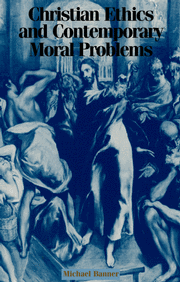Book contents
- Frontmatter
- Contents
- Preface
- Acknowledgements
- 1 Turning the world upside down – and some other tasks for dogmatic Christian ethics
- 2 Christian anthropology at the beginning and end of life
- 3 The practice of abortion: a critique
- 4 Economic devices and ethical pitfalls: quality of life, the distribution of resources and the needs of the elderly
- 5 Why and how (not) to value the environment
- 6 On not begging the questions about biotechnology
- 7 ‘Who are my mother and my brothers?’: Marx, Bonhoeffer and Benedict and the redemption of the family
- 8 Five churches in search of sexual ethics
- 9 Prolegomena to a dogmatic sexual ethic
- Bibliography
- Index
2 - Christian anthropology at the beginning and end of life
Published online by Cambridge University Press: 21 May 2010
- Frontmatter
- Contents
- Preface
- Acknowledgements
- 1 Turning the world upside down – and some other tasks for dogmatic Christian ethics
- 2 Christian anthropology at the beginning and end of life
- 3 The practice of abortion: a critique
- 4 Economic devices and ethical pitfalls: quality of life, the distribution of resources and the needs of the elderly
- 5 Why and how (not) to value the environment
- 6 On not begging the questions about biotechnology
- 7 ‘Who are my mother and my brothers?’: Marx, Bonhoeffer and Benedict and the redemption of the family
- 8 Five churches in search of sexual ethics
- 9 Prolegomena to a dogmatic sexual ethic
- Bibliography
- Index
Summary
If theological ethics speaks about man, it does not have in view man as he understands himself but man as he knows that he is understood, as he finds himself addressed by the Word of God that has come to him.
Christian medical ethics, in so far as it is Christian medical ethics, speaks on the basis of the distinctive knowledge of humankind which is given by the Word of God. It thus does not and cannot make common cause with ‘bioethics’, or ‘biomedical ethics’, as these are usually practised, for as thus practised they do not view humankind in the light of this knowledge. Christian medical ethics is, rather, obliged to begin from its own starting place, taking up its constructive task from its unique and distinctive presupposition, namely the Gospel of Jesus Christ. For it is in the light of this Gospel of the Word spoken to humankind, that humankind gains a true self-understanding.
The subject of medical ethics can be thought of, we might say, as the beginning, being and ending of human life in so far as this beginning, being and ending properly become the concern of medicine and, in turn, pose ethical questions. On the basis of what has already been said, however, it will be clear that our very identification of these questions, as well as our answering of them, must be determined by the understanding of humankind gained from our knowledge of the Word of God.
- Type
- Chapter
- Information
- Christian Ethics and Contemporary Moral Problems , pp. 47 - 85Publisher: Cambridge University PressPrint publication year: 1999
- 1
- Cited by



